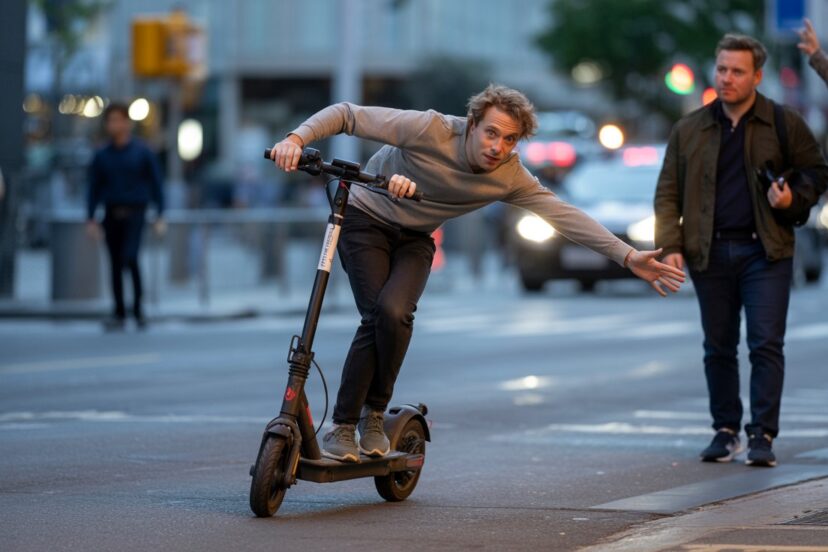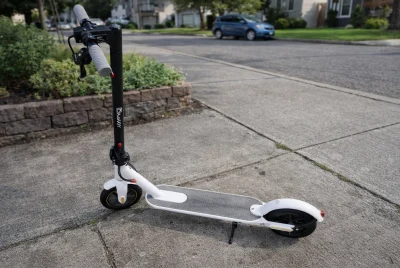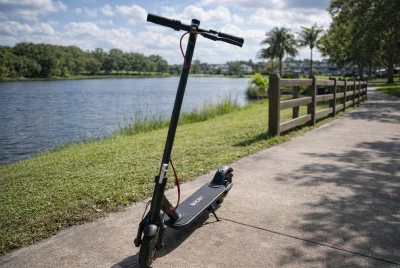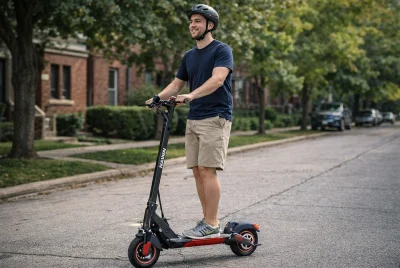E-Scooter DUI Laws: What Riders Need to Know
*We may earn a commission for purchases made using our links. Please see our disclosure to learn more.
The sun was setting as riders zipped through downtown streets on their electric scooters, weaving past traffic lights and bustling patios. Many were fresh from happy hour, still buzzing from the craft beers they’d enjoyed, and most had no idea that their decision to hop on a scooter instead of getting behind the wheel could still land them in handcuffs.
What began as a seemingly safer alternative to drunk driving has quietly become a legal minefield, catching thousands of riders off guard each year. Across the U.S., people assume electric scooters exist in a legal gray area — that because they aren’t cars, the rules don’t apply. But in many states, e-scooters are treated just like motor vehicles when it comes to impairment. That misconception has led to fines, criminal charges, license suspensions, and, in some cases, devastating accidents.
For riders who believed they were making the responsible choice, the consequences can feel shocking and unfair — yet the law is often clear: drunk riding isn’t just dangerous, it’s illegal.
“The rise of e-scooters has created new challenges in traffic enforcement. Many riders don’t realize these devices are subject to the same DUI laws as traditional vehicles.”
– National Traffic Safety Administration
Key Takeaways
- E-scooters are considered vehicles under DUI laws in most jurisdictions
- Blood alcohol limits typically mirror those for cars (0.08% BAC)
- Penalties can include fines, license suspension, and criminal charges
- Legal consequences vary significantly by state and local jurisdiction
- Insurance implications may affect coverage for accidents or claims
The Legal Reality of E-Scooter DUI Laws
The legal landscape surrounding electric scooters has evolved rapidly, often faster than public understanding. Most jurisdictions now classify e-scooters as motor vehicles or similar conveyances, subjecting them to the same DUI statutes that govern cars, motorcycles, and other motorized transportation.
This classification means that operating an electric scooter while under the influence carries the same legal weight as drunk driving. The blood alcohol concentration (BAC) limits, typically 0.08% for adults and lower thresholds for commercial drivers or those under 21, apply equally to e-scooter operators.
State-by-State Variations in E-Scooter DUI Enforcement
The enforcement and penalties for e-scooter DUI violations vary dramatically across different states and municipalities. Some jurisdictions have embraced strict enforcement, while others maintain more lenient approaches or unclear guidelines.
Strict Enforcement States treat e-scooter DUI exactly like vehicle DUI, with identical penalties including potential jail time, substantial fines, and driver’s license suspension. These states recognize that impaired operation of any motorized device poses public safety risks.
Moderate Enforcement Jurisdictions may impose reduced penalties compared to traditional vehicle DUI but still maintain criminal consequences. These areas often focus on education and community service rather than severe punishment for first-time offenders.
Unclear or Developing Laws exist in regions where legislation hasn’t caught up with micromobility trends. However, this doesn’t provide legal protection, as general DUI statutes often still apply under broader vehicle operation definitions.
Common Legal Challenges and Misconceptions
Many riders face legal troubles due to widespread misconceptions about e-scooter regulations. The belief that these devices are somehow exempt from DUI laws has created a false sense of security among users.
The “It’s Not a Real Vehicle” Myth
The most dangerous misconception involves the classification of e-scooters. Legal definitions of “motor vehicle” or “vehicle” in DUI statutes are typically broad, encompassing any motorized conveyance used for transportation. This inclusive language specifically covers electric scooters, e-bikes, and similar devices.
Courts consistently uphold DUI convictions for e-scooter operators, rejecting arguments that these devices fall outside traditional vehicle categories. The motorized nature and transportation purpose clearly place them within existing legal frameworks.
The Responsibility Paradox
Ironically, many individuals choose e-scooters believing they’re making a responsible decision to avoid drunk driving. This good intention doesn’t provide legal protection, creating a paradox where attempting to be responsible still results in legal consequences.
The solution isn’t abandoning micromobility options but understanding that the same sobriety standards apply regardless of the vehicle type. Alternative transportation methods like rideshare services, public transit, or designated drivers remain the only legally safe options when drinking.
Penalties and Legal Consequences
E-scooter DUI penalties mirror those for traditional vehicle DUI in most jurisdictions, though some areas impose modified consequences recognizing the different risk profiles of these devices.
Financial Penalties
Fines for e-scooter DUI typically range from several hundred to several thousand dollars, depending on jurisdiction and offense history. These base fines often multiply when including court costs, legal fees, and mandatory program expenses.
Additional financial consequences may include increased insurance premiums, even though the offense didn’t involve a traditional vehicle. Insurance companies increasingly consider any DUI conviction when calculating risk and setting rates.
Criminal Record Implications
DUI convictions create permanent criminal records that affect employment opportunities, professional licensing, and background checks. The vehicle type doesn’t influence the severity of this long-term consequence.
Professional drivers, healthcare workers, and others in regulated industries may face additional licensing issues or employment restrictions based on DUI convictions, regardless of whether they involved cars or e-scooters.
License Suspension Issues
Driver’s license suspension represents one of the most confusing aspects of e-scooter DUI penalties. Even though the offense didn’t involve driving a car, most states still suspend driver’s licenses as part of DUI penalties.
This creates significant practical challenges, as individuals lose their ability to drive cars for work, family obligations, or daily activities. The suspension applies even if they don’t own a car and relied primarily on alternative transportation methods.
Impact on Insurance and Civil Liability
E-scooter DUI convictions affect insurance coverage in ways many riders don’t anticipate. Auto insurance companies consider any DUI conviction when assessing risk, potentially increasing premiums or denying coverage renewal.
Personal Injury Protection
Accidents involving intoxicated e-scooter operators may complicate insurance claims. Personal injury protection or health insurance companies might deny claims related to injuries sustained during illegal activities, including DUI operation of any vehicle.
Liability for Damages
Intoxicated e-scooter operators remain liable for property damage or injuries they cause to others. This civil liability exists independently of criminal penalties and can result in significant financial exposure.
Insurance policies may exclude coverage for damages caused while operating vehicles under the influence, leaving operators personally responsible for accident costs, medical bills, and legal settlements.
Enforcement Challenges and Officer Discretion
Law enforcement faces unique challenges when addressing e-scooter DUI cases. Traditional traffic stops don’t always apply to scooter operations, creating procedural questions about initial contact and investigation methods.
Field Sobriety Testing Adaptations
Standard field sobriety tests designed for vehicle operators may require modification for e-scooter cases. Balance and coordination assessments remain relevant, but officers must adapt techniques for the specific challenges of scooter operation.
Some jurisdictions have developed specific protocols for micromobility DUI investigations, while others apply existing procedures with minor modifications.
Technology and Detection
Unlike cars with ignition interlock device options, e-scooters present technological challenges for preventing impaired operation. Shared scooter companies have begun exploring solutions, including app-based sobriety checks or partnership with ride-sharing services during high-risk hours.
Prevention and Risk Reduction Strategies
Understanding e-scooter DUI laws enables better decision-making and risk reduction. Riders can enjoy micromobility benefits while avoiding legal complications through proper planning and awareness.
Pre-Planning Transportation
The most effective strategy involves planning transportation before drinking begins. This includes identifying alternative options, downloading ride-sharing apps, researching public transit schedules, or arranging designated drivers.
Many successful riders treat e-scooters like cars in their transportation planning, recognizing that both require sobriety for legal operation.
Technology Solutions
Smartphone apps can help riders make informed decisions by tracking alcohol consumption, estimating BAC levels, or providing alternative transportation options. While these tools shouldn’t replace good judgment, they can support responsible decision-making.
Some riders set phone reminders or use apps that restrict certain functions during predetermined high-risk periods.
The Future of E-Scooter Regulation
E-scooter DUI laws continue evolving as legislators, law enforcement, and communities adapt to micromobility growth. Future developments may include modified penalty structures, enhanced prevention technologies, or clearer regulatory frameworks.
Legislative Trends
Some jurisdictions consider separate penalty structures for micromobility DUI that account for the different risk profiles compared to traditional vehicles. These modifications might include reduced penalties while maintaining the core prohibition against impaired operation.
However, the trend generally favors maintaining equivalent standards, reflecting concerns about public safety and the principle that impairment creates risks regardless of vehicle type.
Industry Response
Scooter-sharing companies increasingly implement features designed to reduce impaired riding, including educational content, partnership with transportation alternatives, and technology solutions that detect potential impairment indicators.
These industry initiatives complement legal enforcement but don’t replace the fundamental requirement for rider responsibility and legal compliance.
Conclusion
E-scooter DUI laws represent a critical intersection of technological advancement and legal evolution. The convenience and environmental benefits of electric scooters don’t exempt them from fundamental safety regulations designed to protect all road users.
Understanding these laws empowers riders to make informed decisions that preserve their legal standing while enjoying the benefits of micromobility. The key lies in treating e-scooters with the same respect and legal awareness applied to any motorized vehicle.
The most successful approach involves comprehensive transportation planning that accounts for all activities and circumstances. By recognizing e-scooters as legitimate vehicles subject to the same sobriety requirements as cars, riders can avoid the legal pitfalls that have ensnared thousands of well-intentioned individuals.
The future of micromobility depends on responsible use that respects both the technology’s potential and the legal framework governing its operation. Through education, awareness, and responsible decision-making, riders can help ensure that e-scooters remain a positive addition to urban transportation ecosystems.
Frequently Asked Questions
Q: Can I get a DUI on an e-scooter even if it’s not plugged in or the battery is dead?
A: Generally no, if the e-scooter is completely inoperable and you’re not attempting to ride it. However, if you’re pushing it while intoxicated on public roads, you might still face public intoxication charges depending on local laws.
Q: Do e-scooter DUI laws apply on private property like parking lots or private roads?
A: This varies by jurisdiction. Many DUI statutes apply to any “public way” or area accessible to the public, which can include private parking lots of businesses, shopping centers, or apartment complexes. Private driveways or truly private property typically don’t fall under DUI laws.
Q: If I get an e-scooter DUI, will it affect my car insurance rates even though I wasn’t driving a car?
A: Yes, most insurance companies consider any DUI conviction when calculating rates and assessing risk, regardless of the vehicle type involved. This can result in significant premium increases or policy cancellation.
Q: Are the BAC limits the same for e-scooters as for cars?
A: In most jurisdictions, yes. The standard 0.08% BAC limit for adults typically applies to all motorized vehicles, including e-scooters. Some states have lower limits for commercial drivers (0.04%) or zero tolerance for drivers under 21, which also apply to e-scooter operators.
Q: Can I refuse a breathalyzer test if I’m stopped while riding an e-scooter?
A: You can refuse, but most states have “implied consent” laws that impose automatic license suspension and other penalties for refusal, regardless of whether you were operating a car or e-scooter. The refusal itself can be used as evidence in court and may result in harsher penalties than taking the test.




